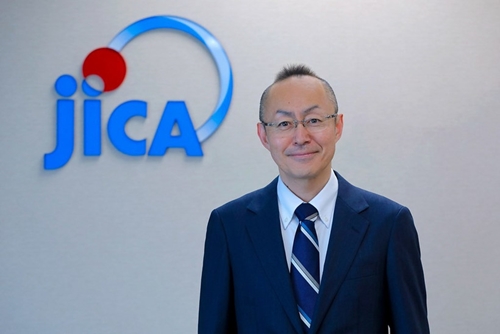In an interview granted to the Vietnam News Agency (VNA), Yosuke assessed that Vietnam's socio-economic transformation in recent years has been truly impressive. Since the early 2000s, its per capita income has quadrupled, from around 1,000 USD in 2008 to over 4,100 USD in 2023. Alongside this, there have been significant advancements in education and health care, with the proportion of people holding university degrees rising from 20% to 45%, and health insurance coverage expanding from 57% to 93%.
    |
 |
|
Chief Representative of JICA Vietnam Office Kobayashi Yosuke (Photo: JICA) |
These achievements reflect the nation's strong commitment to inclusive development, strategic reforms, and international integration, he stated, affirming that a dynamic private sector, substantial infrastructure investment, and expanding global partnerships have positioned it as a vibrant middle-income economy in the region.
Regarding Vietnam - JICA partnership, the chief representative noted that JICA’s cooperation with Vietnam has a long history, especially following Japan’s resumption of Official Development Assistance (ODA) in 1992.
The two sides have also implemented a long-term legal and judicial cooperation program. The projects in this field have helped Vietnam lay the foundation for international integration and legal system development - two of the four key pillars in the country’s reform strategy aimed at becoming a high-income nation by 2045.
In terms of infrastructure development, JICA has supported numerous strategic projects, including roads, bridges, seaports, airports, power plants, and wastewater treatment facilities. Among them, one of the most symbolic projects in recent years is Ho Chi Minh City’s Metro Line No. 1, the first underground urban railway in Vietnam.
The agency is currently also supporting the preparation of Hanoi’s Metro Line No. 2, named Nam Thang Long – Tran Hung Dao, with a view to expanding both this line and Ho Chi Minh City’s Metro Line No.1, to eventually connect Ho Chi Minh City with Binh Duong, and Nam Thang Long with Noi Bai International Airport.
In addition, it has placed strong emphasis on supporting education, healthcare, and human resources development, contributing to the realization of the shared development goals of both Governments, Yosuke shared.
The chief representative went on to say that JICA’s current priorities are closely aligned with Vietnam’s four pillars of reform: science and technology, international integration, private sector development, and legal system building, with the overarching goal of transforming Vietnam into a high-income country by 2045.
For example, he said, in the field of science, technology, and innovation, the new undergraduate program at the Vietnam–Japan University will contribute to training 50,000 Vietnamese experts by 2030. He added that JICA is partnering with various universities and research institutes to develop technologies for climate change adaptation, and implements projects such as Sabo dams, designed to prevent flash floods, to mitigate landslide risks.
Yosuke also affirmed that JICA welcomes Vietnam’s ongoing institutional and administrative reforms and is ready to continue its support for these efforts.
According to him, Japan has a two-tier local government system similar to Vietnam’s current structure and has undergone major administrative reforms, including a reduction in the number of administrative units from 3,232 in 1999 to 1,724 by 2025, along with the promotion of decentralization to local administrations.
As, Vietnam is likely to face some of the same challenges Japan is currently dealing with, Yosuke recommended that Vietnam not only learn from Japan’s current model, but also from the trial-and-error process that Japan has gone through and will continue to experience in the years ahead.
Source: VNA